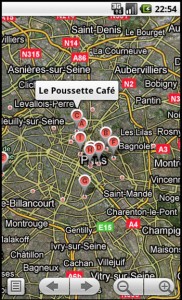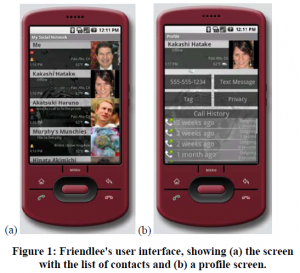We created an online survey on freeonlinesurveys.com and had it running for 3 days. The purpose was to ask other people what they thought of our ideas for a mobile app and have them to choose between 3 possible applications that we wereWe shared the link on our facebook accounts as well as on MSN and 84 people responded to it (which is quite a large number of participants). The link for the survey is no longer available since we had to pay and become premium members in the website in order to be able to look at the results forever. However, we have saved the results into a word file which I have uploaded. The link is given after the survey questions.
The questions included in the survey were the following:
1) Gender (Male/Female)
2) Do you own a smartphone (e.g. iphone) which can access the internet? (Yes/No)
3) Do you use your smartphone to search and download applications? (Yes/No)
4) We have come up with some ideas for mobile applications and we want to present them to you and ask for your feedback.
One idea is for an application similar to facebook places where users would be able to not only state where they are but also provide useful information about that place. Some examples include coffee shops, restaurants, pubs and clubs and the information they could provide are things like:
– “Is the place (coffee shop, club, etc) empty, few peoplke, half-full, almost full, full?”,
– “What groups of people are present? Young, middle-age, old people”,
– “What kind of music does it currently play?”
These are just some examples of information that could be provided interactively by users of the application. We believe that by learning for example if a place is empty or full, people can decide whether they want to go there or try another place. This can save them time, for example. Users could also get to meet one another. They could also be able to comment on these information or rate it as trustworthy or not, they could post their own information about the same place and the system could possibly weigh the two feedback based on each user’s trustworthiness. Owners of such places may also find it useful to promote their venues if they wanted.
Another idea is an application where shop owners as well as users would be able to post information about sales, offers and discounts provided at a specific shop. We believe that this information is only available when people visit the shops or if they specifically search each shop’s website. By using this application, users could get informed on current sales and offers without the need to go to the shop themselves. Shop owners could also use this to promote and advertise their shops. By allowing users to post such information, other people can also read comments about how worthy or accurate an advertisement/offer is and perhaps find out about the variety of items offered on sale, their availability and their price ranges.
A third idea is to design a mobile application that would receive live data from buses (and/or trains) just like the data you can see at a bus stop (e.g. bus1 arriving in 7 minutes). Again, this information is only available once a person goes to a bus stop. But if this infromation was available as a mobile app, people would not waste time waiting at the bus stops, especially if it’s cold or if it’s late at night, etc. The application could also enable a user to read the route timetables or propose possible bus routes for going to a destination (this kind of applications are already available, of course, but not with the feature of live information, we believe=).
Please tell us which of the 3 ideas you find more interesting (maybe more than 1) and think that you could actually be using it regularly. Use the textbox in the next question to tell us possible additional useful features that these applications could have or maybe some alterations.
| Venue (coffee shops, pubs, clubs) information |
| Shop sales, discounts and offers |
| Live travel information |
5) Tell us your thoughts on our ideas explained above
6) We would be more than happy to read your own ideas and suggestions for a mobile application (always related to social networking, i.e. an application that users could interact and feed information) that you think would be useful to people. It could be anything you ever thought would be handy to have on your smartphone.
The results can be seen in this word document (responses for participants’ thoughts on our ideas and any new ideas):
http://users.ecs.soton.ac.uk/ka2v07/COMP6051/SurveyResults.docx
The responses we received indicated that most participants prefered the Live Travel Information app, then the Venue information and the least prefered was the shop sales app. However, we then realised that the Live Travel Information app could not actually include a social network feature and we therefore couldn’t choose that one. We then discussed and chose to go with the Shop sales/discounts/offers app since it has the advantage that it could more easily be made profitable than the venue one and also it can be more useful than simply giving information about the number of people in a place and so on. So in other words, we chose usefulness and profitability instead of fun and gossip (?). We did consider what everyone told us, however, and we will try and implement some of the ideas that the participants shared with us in our shopster app.
We are also thinking of conducting another survey in the coming weeks for choosing what features to include in the app and whether people are willing to pay a small amount of money to become a premium member in order to be able to enjoy some more advanced features of the app (such as location searching).

